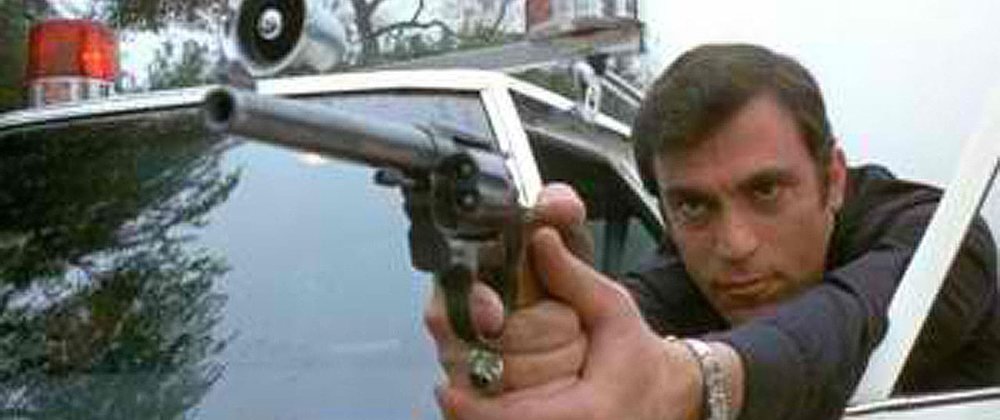Schlockmania's Favorite Episodes From POLICE STORY: SEASON 3 - Part 1
The third season of PoliceStory was broadcast between September of 1975 and March of 1976, racking upanother 22 episodes for this well-liked anthology series. It stayed consistentwith the show's theme about the complexities of policework and the personalbaggage that accumulates both on and off the job for officers. It produced anumber of fine episodes and this overview covers six examples that show offwhat made this show so special.
OfficerNeeds Help: Sgt. Billy Humm (Cliff Gorman) is a tough cop who isexcellent at handling life-and-death situations on the streets. He's respectedby his brother officers but the brass doesn't like that he's been involved inseveral shootings, despite the fact that all involved a proper use of force.This is a compelling character portrait that allows the show to explore thepressures that cops live with due to the potential for violence and death intheir work. In typical Police Storyfashion, there are no simple solutions. Gorman gives a strong, intense leadperformance and gets nice support from Richard Drout Miller, a show regular whomakes a big contribution to the episode's haunting final scene.

TheCutting Edge: Sgt. Ed Peebles (Chuck Connors) isbreaking in new partner Elmore "Rocky" Caddo (Sylvester Stallone) asthe two try to track down some violent and prolific bank robbers. Ed is alsodealing with loss: a wife who passed away, a partner who retired and his ownencroaching retirement. This is a good example of how Police Story could combine the action expected in a cop show - thebank robbery scenes are pretty hard-hitting - with poignant themes about thepsychology of a cop. Connors is fantastic as a veteran officer who struggleswith the transitional phase he is in despite his grizzled persona and a youngStallone is quite witty as the new partner (ironically nicknamed"Rocky").
ACommunity Of Victims: This is a unique episode because itdevotes equal time to character portraits for both the cops and thecrooks. Priest (Cleavon Little) andRipley (Michael Brandon) are hotshot patrolmen who love their job. What theydon't know they're on a collision course with a group of junkies-turned-thieveswhose leader, Stack (Charles Weldon), just acquired a handgun. The resultapplies the character study approach to people on both sides of a conflict andthus adds depth to a familiar plot. Little and Brandon are appropriatelycharismatic but Weldon does nice work in a deeper-than-usual portrait of athief. Exploitation movie fans, take note: Ann Ruymen from Private Parts gives an impressive support performance as Stack'sgirlfriend.
TheEmpty Weapon: The veteran partner of rookie officer DavidSinger (Kurt Russell) is shot on their first day out together by juveniledelinquent Danny Boy (Andrew Stevens) - but doesn't Singer shoot the kid whenhe finds him because he knows he's out of bullets. Singer finds himselfostracized by fellow officers who think he should've shot the kid... and tomake matters worse, the juvenile justice system is all too easy for sociopathicDanny Boy to manipulate his way through. A great example of how Police Story could be tough andthoughtful all at once, offering a potent critique of both failings in thejustice system and how the police force enforces its own unspoken code ofconduct towards its own members. Russell gives a strong performance that pointstoward his adult career in the '80s and Stevens is genuinely unnerving as hisfoe. Also of note: strong direction from Michael O'Herlihy, including aninventive sequence where the trashing of a house is suggested by sound designrather than shown.

LittleBoy Lost: Detective Ed Brenner (Robert Forster) is called inwhen a young boy suddenly vanishes from his own front yard, leading to adifficult search and some revelations about the life of the sweet but neglectedlittle boy. Brenner is dealing with a divorce and trying to figure how toremain a good father to his son, which makes the case all the more personal forhim. This was based on a real case in California and is one of the show'sall-time strongest episodes in purely dramatic terms. It makes some toughpoints about how child neglect is just a different, more "polite"form of child abuse and shows how the grind of pursuing such heartbreaking casescan wear on the officers doing the work. Forster gives a subtle but powerfulperformance here: the final scene is uncompromising in typical Police Story fashion and Forsterabsolutely nails it.
BreakingPoint: Sergeant VinceDella Maggiori (Tony Musante) is brought in to investigate when a policepursuit ends in a patrolman (Michael Anderson Jr.) shooting a man dead in hisown hotel room. Della Maggiori quickly susses out the patrolman isn't beingtotally honest and risks contempt from the rank and file to find out the truthabout what happened. This episode gets at some classic problems inherent to thepolice force, namely loyalty to doing the work right versus loyalty to one'spartner and the ever-present tensions when one cop investigates another.Musante's fiery performance makes a memorable contrast to Anderson Jr.'schilliness. Robert L. Collins, creator of PoliceWoman, directed here and shows an excellent visual sense, particularly inhis use of p.o.v. camerawork for the Rashomon-stylevarying accounts of what happened.


